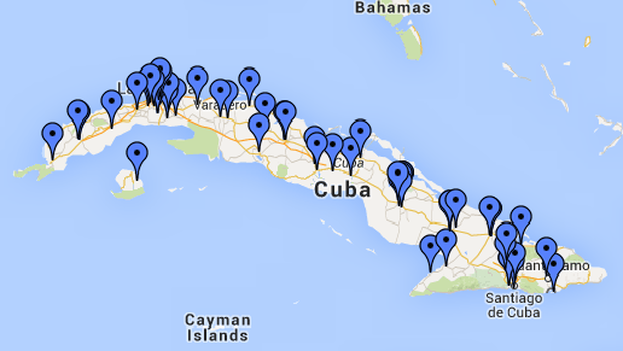
14ymedio, Marlene Azor Hernandez, Mexico City, 18 September 2015 – The pardon of 3,522 ordinary prisoners in Cuba is excellent news, above all for their relatives. At the beginning of July something similar occurred when the Pope visited Bolivia, Ecuador and Paraguay. In the first two countries, the governments also took the measure with respect to the incarcerated, but it was not of this breadth. In Ecuador 24 inmates benefitted from the measure; in Bolivia there were no pardons, but hundreds of the more than 5,000 prisoners in the most populous jail in the country, Palmasola, would finally be sentenced and be visited by the Pope in his tour of the country.
Ecuador has more than 16 million residents, a penal population of 21,000 prisoners and 24 penitentiaries. In Cuba, for a population of 11 million residents, there are at least 200 jails, and the penal population is estimated at 70,000 prisoners. It seems that the elevated number of pardons is due also to prison overcrowding on the Island.
The Cuban government has staged “a positive coup” in international politics, above all with respect to those countries and institutions that need gestures from Havana in order to be able to give it their support. For a curious observer, the pardon figures raise other questions in the wake of the announcement.
In Bolivia, Ecuador and Paraguay, there are no political prisoners because public demonstrations in the street and freedom of association, movement and expression are guaranteed. That is not the case in Cuba where the dissenters suffer long jail sentences, beatings, and moral stonings on Cuban television.
The Cuban Penal Code, like that of the Soviets in the 1930’s and perhaps the North Korean one, punishes “illegal” exit from the country, contempt (resisting warrantless arrest) and the so-called “pre-criminal dangerousness,” that aberrant legal concept that is applied to crimes not yet committed. The gag law also remains in effect (Ley 88) which penalizes the mere fact of speaking against the government or publishing in the international press (as happened in the Black Spring of 2003 when 75 people were sentenced to 20 and 25 years in prison). None of these criminal laws exist in Bolivia, Paraguay or Ecuador, although censorship of the non-government press does exist.
In the Cuba that Pope Francis will visit there are today some 60 political prisoners according to the Cuban Commission on National Human Rights and Reconciliation (CCDHRN), and civic and political activism is prohibited. The pardon of the 3,522 prisoners will try to cover up this sad reality.
Translated by Mary Lou Keel
